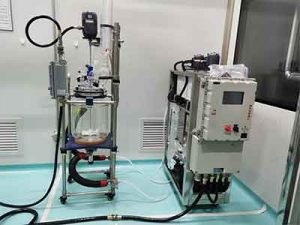oil circulator heaters
What is an Oil Circulator Heater?
An oil circulator heater is a temperature control device that uses thermal oil as a heat transfer medium to provide precise and uniform heating in industrial and laboratory settings. These heaters are designed to achieve and maintain high temperatures, often exceeding 300°C (572°F), making them suitable for applications where water-based systems are inadequate. Oil circulator heaters are widely used in industries such as chemical processing, pharmaceuticals, and materials science, where accurate and stable temperature control is critical.

How Does an Oil Circulator Heater Work?
Oil circulator heaters operate through a closed-loop system, which involves the following steps:
Heating Process: The heater warms the thermal oil to the desired temperature using an electric heating element or a gas-fired burner.
Circulation: A pump circulates the heated oil through the system, transferring heat to the process or equipment.
Heat Transfer: The thermal oil releases heat to the application, ensuring uniform temperature distribution.
Recirculation: The cooled oil returns to the heater, where it is reheated and recirculated, maintaining a continuous cycle.
This process allows oil circulator heaters to provide consistent and precise temperature control, even at high temperatures.
Types of Oil Circulator Heaters
Oil circulator heaters can be categorized based on their design and functionality:
Electric Oil Circulator Heaters: These heaters use electric heating elements to warm the thermal oil and are suitable for applications requiring precise temperature control.
Gas-Fired Oil Circulator Heaters: These heaters use gas burners to heat the oil and are ideal for high-capacity industrial applications.
Immersion Heaters: These heaters are submerged directly into the oil reservoir, providing efficient heat transfer.
Circulating Bath Heaters: These heaters combine a heating system with a pump to circulate the oil through an external system or bath.

Applications of Oil Circulator Heaters
Oil circulator heaters are used in a wide range of industrial and laboratory applications, including:
Chemical Processing: Maintaining precise temperatures for chemical reactions, distillations, and polymer processing.
Pharmaceuticals: Ensuring the stability of temperature-sensitive drugs and vaccines during production and testing.
Materials Science: Controlling temperatures for material testing, curing, and heat treatment.
Oil and Gas: Heating pipelines and storage tanks to maintain fluid viscosity and prevent freezing.
Food Processing: Providing uniform heating for cooking, sterilization, and packaging processes.
Key Features to Consider When Selecting an Oil Circulator Heater
Temperature Range: Ensure the heater can achieve the required temperature range for your application.
Heating Capacity: Consider the heating power and flow rate to meet the thermal demands of your process.
Safety Features: Look for heaters with built-in safety features, such as over-temperature protection, pressure relief valves, and alarms.
Compatibility: Verify that the heater is compatible with the thermal oil and the materials used in your system.
Energy Efficiency: Choose heaters with high energy efficiency to reduce operational costs and environmental impact.
Control System: Opt for heaters with advanced control systems, such as PID controllers, for precise temperature regulation.
Advantages of Oil Circulator Heaters
High-Temperature Capability: Oil circulator heaters can achieve and maintain high temperatures, making them suitable for demanding applications.
Uniform Heating: The circulation of thermal oil ensures even heat distribution, preventing hot spots and ensuring consistent results.
Versatility: These heaters can be used in a wide range of industries and applications.
Durability: Built with robust materials, oil circulator heaters are designed to withstand high temperatures and harsh environments.
Safety: Advanced safety features minimize the risk of accidents and equipment damage.
Oil Circulator Heaters vs. Traditional Heating Methods
Compared to traditional heating methods, such as steam or electric heaters, oil circulator heaters offer several advantages:
Higher Temperature Range: Oil circulator heaters can achieve higher temperatures than water-based systems.
Better Heat Transfer: Thermal oil provides efficient and uniform heat transfer, reducing energy loss.
Flexibility: These heaters can be customized to meet the specific requirements of different applications.
Lower Maintenance: The closed-loop system reduces the risk of contamination and scaling, minimizing maintenance needs.

Maintenance of Oil Circulator Heaters
Regular maintenance is essential to ensure the optimal performance and longevity of oil circulator heaters. Key maintenance tasks include:
Inspecting and cleaning the oil reservoir and circulation system to prevent contamination.
Checking and replacing the thermal oil as needed to maintain efficient heat transfer.
Calibrating the temperature control system to ensure accuracy.
Inspecting the heating element and pump for signs of wear or damage.
Monitoring system performance and addressing any issues promptly.
Proper maintenance not only extends the lifespan of the heater but also improves its efficiency and reliability.
Conclusion
Oil circulator heaters are indispensable tools in industrial and laboratory settings, providing precise and reliable temperature control for high-temperature applications. Their ability to achieve uniform heating and maintain stable temperatures makes them a valuable asset in fields such as chemical processing, pharmaceuticals, and materials science. By understanding the working principles, types, and benefits of oil circulator heaters, users can make informed decisions when selecting and maintaining these devices. As technology continues to advance, oil circulator heaters will remain a critical component in supporting innovation and efficiency in high-temperature processes.
Related recommendations
Glass Reactor Cold and Heat Cycle Device
1320Glass Reactor Cold and Heat Cycle Device The glass reactor cold and heat cycle device is widely used in industrial production and plays a very important role. Especially in the chemical indu...
View detailsindustrial water chiller singapore
523Industrial Water Chiller Systems in Singapore: Market Growth and Sustainability Industrial water chiller systems are critical components in Singapore's industrial sector, providing essential co...
View detailsportable air chillers
281Portable Air Chillers: A Comprehensive Overview In an era where flexibility and convenience are highly valued, portable air chillers have emerged as a practical solution for maintaining comfor...
View detailsindustrial heater price
183Industrial heaters, essential for various heating processes in manufacturing, chemical, and other industries, exhibit a wide range of prices due to multiple interconnected factors. Understanding t...
View details
 LNEYA Chiller
LNEYA Chiller






HelloPlease log in